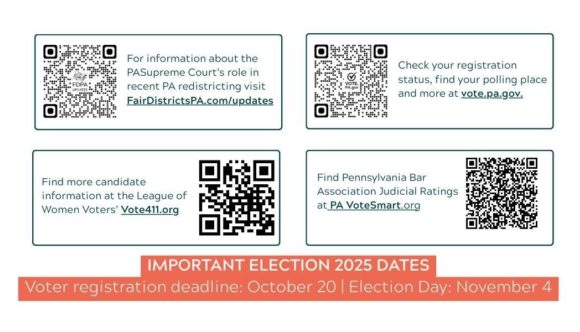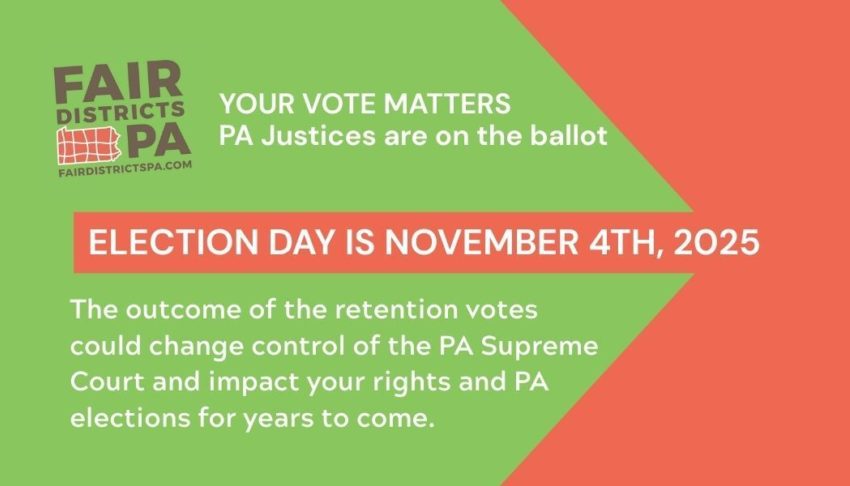Judicial retention elections matter for PA redistricting
The PA Constitution promises free and equal elections. It’s the role of the PA Supreme Court to protect that right.
There are three PA Supreme Court justices, one Commonwealth Court judge, and one Superior Court judge on the ballot for retention on November 4.
PA appellate court justices, for the three courts mentioned above, are elected in partisan elections (in which the party is identified on the ballot) to serve a 10-year term. When that term is concluded, they are subject to non-partisan retention elections (no party is identified) for any further 10-year term.
If a justice is not retained (a majority of PA voters vote NO), the governor at the time selects a temporary replacement, who must be approved by the PA Senate and will serve until a special election is held in the following odd-numbered year. Only one justice has been denied retention since the current system was put in place. According to the Administrative Office of Pennsylvania Courts,
Retention is a nonpolitical method of reelecting Pennsylvania judges and is intended to be politically neutral as they do not require judges to engage in campaigning against other candidates. Retention is specifically designed to keep judges out of the political fray while at the same time holding them accountable to the voters based on their overall records and performance in office. The intent is to provide a fair and nonpartisan way for the public to judge its judges.
Recent state judicial elections have become more and more political, with record campaign spending, often from beyond state borders. Pennsylvania has become a top target for this, in large part due to involvement of PA courts and justices in redistricting and other election related cases.
In February 2025, VoteBeat reported a memo from the Republican State Leadership Committee which “highlighted Pennsylvania’s retention elections, noting those justices would oversee state and federal electoral maps during the next redistricting cycle.” As the article noted, PA trial lawyers and other groups are spending as well, in what one fundraising email described as “one of the most important election years for our future.”
On September 8, Justice Christine Donohue, Justice Kevin Dougherty and Justice David Wecht met for a ninety minute conversation, hosted by multiple good government organizations and televised by PCN. When asked about the role of the courts in a deeply divided time, all three stressed the independence of the court and the need for justices to stand apart from the political process.
Justice Dougherty described the independence of the judiciary as an amazing, even “sacred” part of our constitution. As Justice Wecht explained:
The court is often called upon to make a decision which would go against the will of the temporal majority. The constitution is the fundamental law and is superior to a legislative enactment, so there are times when the court must stand against the popular will, which is very much different from the political branches: the legislative and executive branch of government.
Justice Donohue spoke of the 28 rights provided by Article 1 of the Pennsylvania Constitution, which “in many situations exceed the rights offered by the United States Constitution.” According to Donohue, one of the most important roles of the PA Supreme Court is to ensure those inherent rights are respected.
Please take time to learn more about the retention election, the role of PA’s highest courts, and the justices who will be on the ballot.
Resources
- The Pennsylvania Bar Association offers recommendations regarding candidates, including retention candidates, based not on partisan positions or judicial opinions on specific cases, but on legal qualifications, character, and judicial temperament. Those recommendations are available here.
- Pennsylvanians for Modern Courts provides more information about specific courts, candidate questionnaires, and links to additional PA Bar recommendations here.
- The League of Women Voters of Greater Pittsburgh offers a page of information on Pennsylvania’s State Court System and another about the 2025 Judicial Candidates.
- Fireside Chat: Election 2025: PA Supreme Court Judicial Retentions, PCNTV, Sept 8, 2025
- PA election 2025: What is judicial retention, and why does it matter for Supreme Court balance? Spotlight PA, September 12,2025
- Fair Districts PA: A recent history of PA Supreme Courts role in redistricting, Sept. 12, 2025
- Your Vote Matters: PA Justices Are On the Ballot, downloadable print-at-home one-page handout
- A business card to download, print and share (side one - graphic above/ side two - graphic below) or order directly from CANVA.

